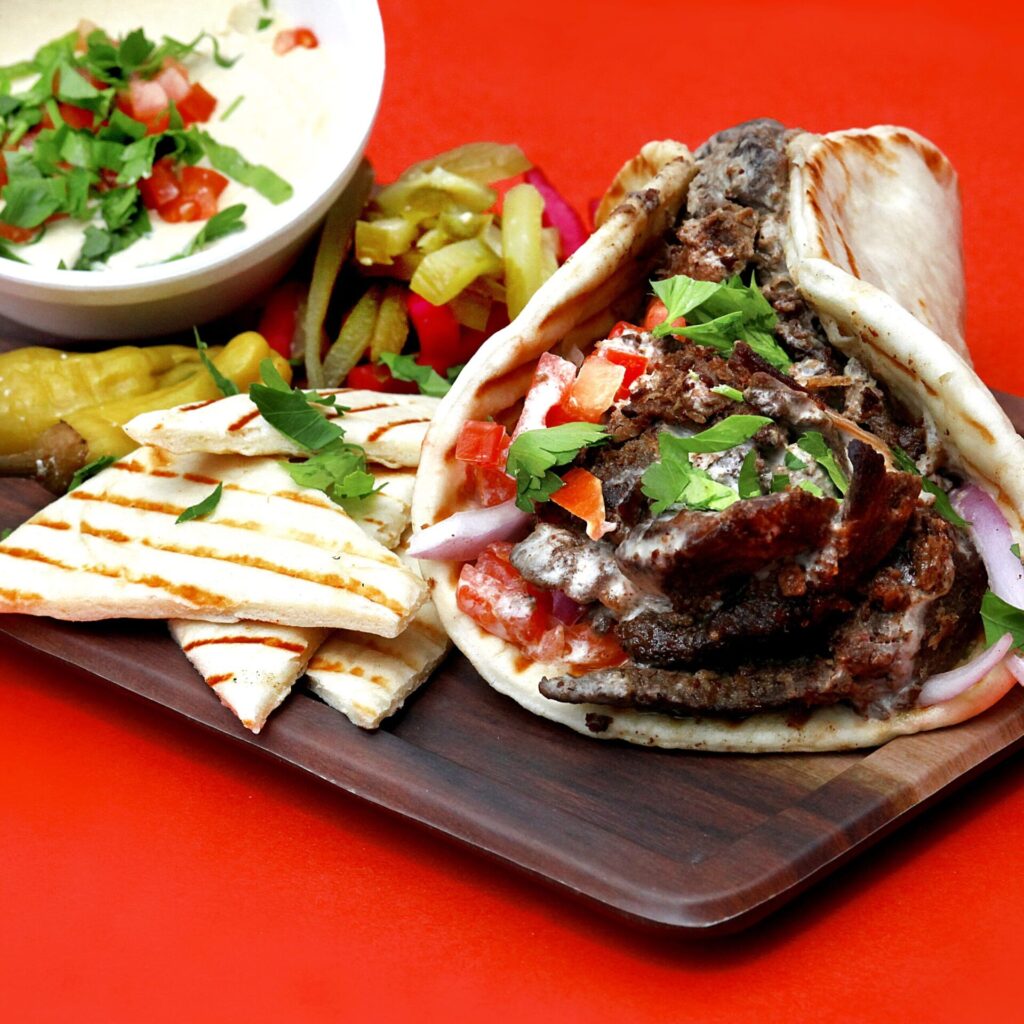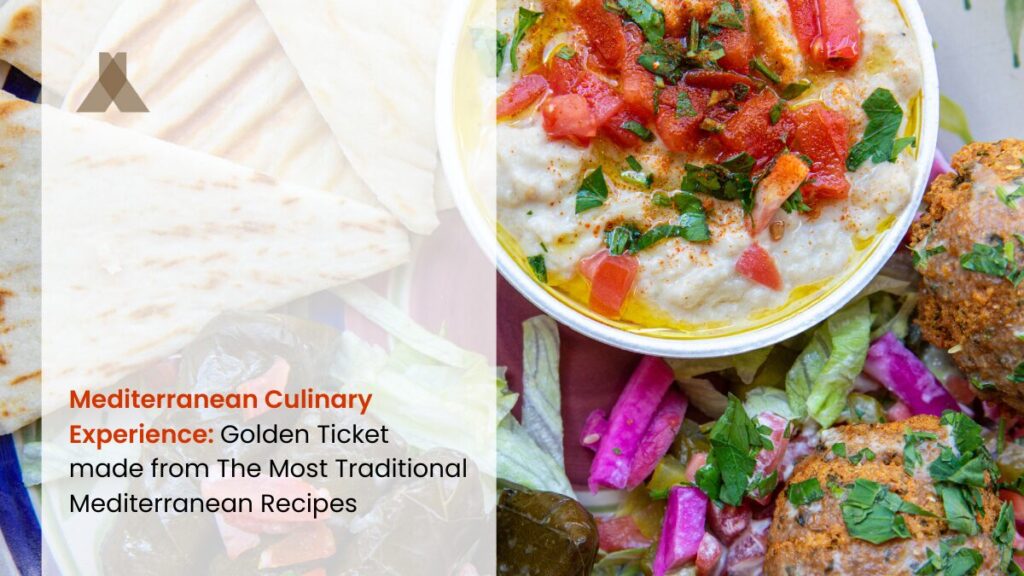The Mediterranean culinary experience has long been celebrated and sought after worldwide for its rich history, coveted, traditional Mediterranean recipes with exotic flavors, and healthful qualities.
Originating from the diverse countries surrounding the Mediterranean Sea, this culinary experience is made with the exquisite olive oil, fresh vegetables, herbs, and a variety of seafood.
The traditional Mediterranean recipes have stood the test of time, offering a truly Mediterranean culinary experience that spans centuries and invites the lucky inhabitants of this world to taste the delights that the coveted Mediterranean flavor has to offer.
The Historical Tradition of Mediterranean Cuisine
The region’s historical influences, including Greek, Italian, Spanish, and Middle Eastern, have contributed to a mixture of cultures and flavors that crossed borders. As food is the essence of culture, today, a traditional recipe from the Mediterranean is the most express and delicious ticket to the other side of the world.
One of the key elements of Mediterranean cuisine is its emphasis on fresh, locally sourced ingredients. Olive oil, a cornerstone of the Mediterranean diet, not only adds a distinctive flavor but also provides numerous health benefits.
Coupled with an abundance of colorful vegetables, Mediterranean spices, and lean proteins, these ingredients form the foundation of traditional Mediterranean recipes.
Mediterranean Culinary Tips and Tricks
To truly immerse yourself in the Mediterranean culinary experience, let’s see some key tips and tricks. Firstly, prioritize quality ingredients: seek out the freshest produce, the finest olive oil and the best-quality seafood.
Don’t shy away from experimenting with herbs like oregano, thyme, and rosemary to enhance the traditional nature of your dishes. Mediterranean cuisine also thrives on simplicity, so focus on letting the natural flavors shine through rather than overcomplicating recipes.
The Keys behind Middle Eastern Cuisine
For an authentic culinary experience brought direct from the Mediterranean, it’s essential to understand the nuances of Middle Eastern cuisine, a significant component of this gastronomic spectrum.
Middle Eastern culinary techniques often involve bold spices, such as cumin, coriander, and sumac. Grains like bulgur and couscous take center stage, offering hearty foundations for a variety of Mediterranean treats.
In Middle Eastern culinary tradition, kebabs are the star of the show. Crafting the perfect kebab involves a careful balance of spices and marination, transforming simple ingredients like lamb or chicken into succulent masterpieces.
Hummus, a creamy blend of chickpeas, tahini, and olive oil, is another staple that graces Mediterranean tables. Pair it with warm pita bread and you will have a traditional Mediterranean recipe to pass from generation to generation.
Delicious and Traditional Mediterranean Recipes
Now let’s dive into some traditional Middle Eastern recipes that define the essence of the Mediterranean.
Steak Shawarma
Ingredients:
- Thinly sliced beef
- Olive oil
- Garlic
- Cumin
- Coriander
- Paprika
- Yogurt
- Lemon juice
Instructions:
- In a bowl, mix olive oil, minced garlic, cumin, coriander, paprika, and a squeeze of lemon juice to create the marinade.
- Coat the thinly sliced beef with the marinade and let it marinate for at least 30 minutes.
- Grill the marinated beef slices until they are cooked to your desired level of doneness.
- Serve the steak shawarma with a side of yogurt sauce and enjoy the Middle Eastern flavors.

Pita Sandwich
Ingredients:
- Pita bread
- Thinly sliced beef (for steak kabob)
- Olive oil
- Garlic
- Cumin
- Coriander
- Paprika
- Yogurt
- Lemon juice
- Tomatoes
- Cucumbers
- Red onions
- Feta cheese
- Kalamata olives
Instructions:
- Marinate the thinly sliced beef for the steak kabob using olive oil, minced garlic, cumin, coriander, paprika, yogurt, and lemon juice.
- Skewer the marinated beef and grill until cooked.
- In a pita bread, assemble the steak kabob along with fresh tomatoes, cucumbers, red onions, crumbled feta cheese, and Kalamata olives.
- Drizzle with olive oil and a squeeze of lemon juice.
Hummus
Ingredients:
- Chickpeas
- Tahini
- Garlic
- Lemon juice
- Olive oil
Instructions:
- In a food processor, blend chickpeas, tahini, minced garlic, and lemon juice until smooth.
- While blending, drizzle in olive oil until the hummus reaches your desired consistency.
- Season with salt to taste.
- Serve the hummus with a drizzle of olive oil on top and enjoy with pita bread or vegetable sticks.
Baba Ganoush
Ingredients:
- Eggplant
- Garlic
- Tahini
- Lemon juice
- Olive oil
Instructions:
- Roast the whole eggplant in the oven until the skin is charred and the flesh is soft.
- Once cooled, peel the skin off the eggplant and mash the flesh.
- Mix the mashed eggplant with minced garlic, tahini, and lemon juice.
- Drizzle with olive oil and refrigerate before serving.
- Enjoy baba ganoush as a dip with pita bread or vegetable crudités.
With these traditional recipes, your Mediterranean dinner is served.
The search for Mediterranean cuisine near me is over. Just go to your kitchen or your favorite Middle Eastern cuisine restaurant. There, these dishes will not only be the stars of the menu, but you will taste them made by professional and local chefs that will open these ingredients to a whole world of possibilities.
The Future of Mediterranean Culinary Trends
As we look ahead, the future of Mediterranean culinary trends is promising. With an increased focus on health-conscious eating, the Mediterranean diet has gained widespread recognition for its benefits.
Expect to see more innovative recipes that fuse traditional flavors with modern twists, catering to diverse dietary preferences. The use of ancient grains, plant-based proteins will continue to evolve the Mediterranean culinary future, so we will start to see more and more Mediterranean eggplant recipes such as the exquisite baba ganoush.
Conclusion: Embark on Your Gateway to Mediterranean Culinary Excellence
The Mediterranean culinary experience opens not only the appetite but also the frontiers to other cultures and different ways of understanding life and food itself.
So, for a true Mediterranean culinary experience, arm yourself with your own repertoire of traditional Mediterranean recipes to travel to the very lands of the Mediterranean with just a bite.



